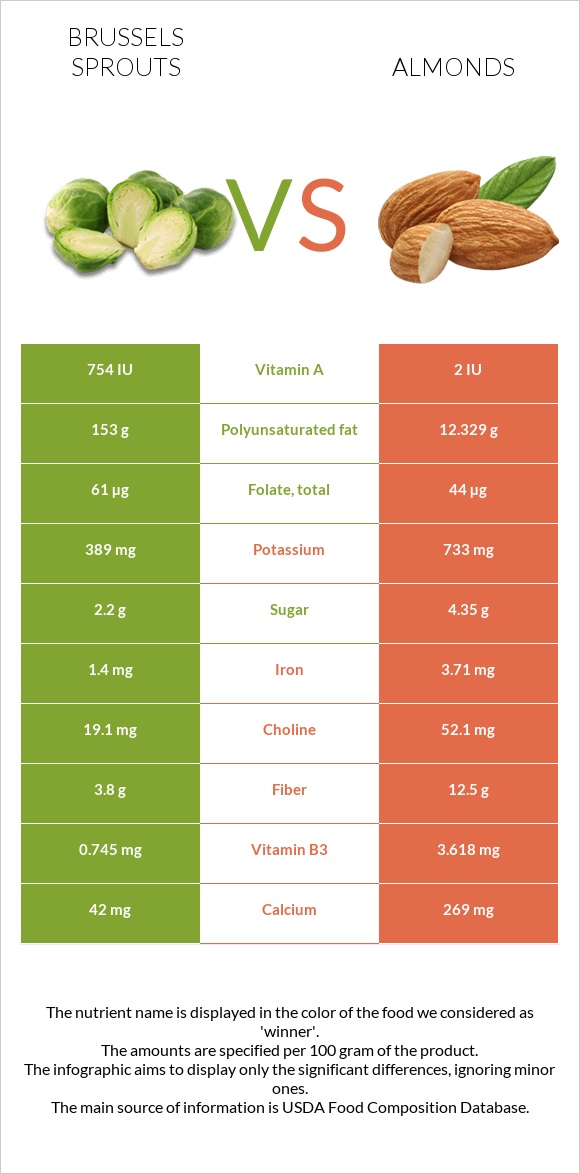Brussels sprouts vs. Almonds — In-Depth Nutrition Comparison
Compare
How are Brussels sprouts and almonds different?
- Brussels sprouts are higher in vitamin K and vitamin C; however, almonds are richer in vitamin E, copper, vitamin B2, manganese, phosphorus, magnesium, fiber, and iron.
- Daily need coverage for vitamin E for almonds is 165% higher.
Brussels sprouts, raw and Nuts, almonds are the varieties used in this article.
Infographic

Infographic link
Mineral Comparison
Mineral comparison score is based on the number of minerals by which one or the other food is richer. The "coverage" charts below show how much of the daily needs can be covered by 300 grams of the food.
| Contains more MagnesiumMagnesium | +1073.9% |
| Contains more CalciumCalcium | +540.5% |
| Contains more PotassiumPotassium | +88.4% |
| Contains more IronIron | +165% |
| Contains more CopperCopper | +1372.9% |
| Contains more ZincZinc | +642.9% |
| Contains more PhosphorusPhosphorus | +597.1% |
| Contains less SodiumSodium | -96% |
| Contains more ManganeseManganese | +546.6% |
| Contains more SeleniumSelenium | +156.3% |
Vitamin Comparison
Vitamin comparison score is based on the number of vitamins by which one or the other food is richer. The "coverage" charts below show how much of the daily needs can be covered by 300 grams of the food.
| Contains more Vitamin CVitamin C | +∞% |
| Contains more Vitamin AVitamin A | +∞% |
| Contains more Vitamin B6Vitamin B6 | +59.9% |
| Contains more Vitamin KVitamin K | +∞% |
| Contains more FolateFolate | +38.6% |
| Contains more Vitamin EVitamin E | +2812.5% |
| Contains more Vitamin B1Vitamin B1 | +47.5% |
| Contains more Vitamin B2Vitamin B2 | +1164.4% |
| Contains more Vitamin B3Vitamin B3 | +385.6% |
| Contains more Vitamin B5Vitamin B5 | +52.4% |
All nutrients comparison - raw data values
| Nutrient |  |
 |
DV% diff. |
| Polyunsaturated fat | 153g | 12.329g | 938% |
| Vitamin E | 0.88mg | 25.63mg | 165% |
| Vitamin K | 177µg | 0µg | 148% |
| Copper | 0.07mg | 1.031mg | 107% |
| Vitamin C | 85mg | 0mg | 94% |
| Vitamin B2 | 0.09mg | 1.138mg | 81% |
| Manganese | 0.337mg | 2.179mg | 80% |
| Monounsaturated fat | 0.023g | 31.551g | 79% |
| Fats | 0.3g | 49.93g | 76% |
| Magnesium | 23mg | 270mg | 59% |
| Phosphorus | 69mg | 481mg | 59% |
| Protein | 3.38g | 21.15g | 36% |
| Fiber | 3.8g | 12.5g | 35% |
| Iron | 1.4mg | 3.71mg | 29% |
| Calories | 43kcal | 579kcal | 27% |
| Zinc | 0.42mg | 3.12mg | 25% |
| Calcium | 42mg | 269mg | 23% |
| Vitamin B3 | 0.745mg | 3.618mg | 18% |
| Saturated fat | 0.062g | 3.802g | 17% |
| Potassium | 389mg | 733mg | 10% |
| Vitamin B1 | 0.139mg | 0.205mg | 6% |
| Vitamin B6 | 0.219mg | 0.137mg | 6% |
| Choline | 19.1mg | 52.1mg | 6% |
| Selenium | 1.6µg | 4.1µg | 5% |
| Carbs | 8.95g | 21.55g | 4% |
| Vitamin A | 38µg | 0µg | 4% |
| Folate | 61µg | 44µg | 4% |
| Vitamin B5 | 0.309mg | 0.471mg | 3% |
| Sodium | 25mg | 1mg | 1% |
| Fructose | 0.93g | 0.11g | 1% |
| Net carbs | 5.15g | 9.05g | N/A |
| Sugar | 2.2g | 4.35g | N/A |
| Starch | 0.72g | 0% | |
| Trans fat | 0g | 0.015g | N/A |
| Tryptophan | 0.037mg | 0.211mg | 0% |
| Threonine | 0.12mg | 0.601mg | 0% |
| Isoleucine | 0.132mg | 0.751mg | 0% |
| Leucine | 0.152mg | 1.473mg | 0% |
| Lysine | 0.154mg | 0.568mg | 0% |
| Methionine | 0.032mg | 0.157mg | 0% |
| Phenylalanine | 0.098mg | 1.132mg | 0% |
| Valine | 0.155mg | 0.855mg | 0% |
| Histidine | 0.076mg | 0.539mg | 0% |
| Omega-3 - ALA | 0.003g | N/A | |
| Omega-6 - Eicosadienoic acid | 0.002g | N/A | |
| Omega-6 - Linoleic acid | 12.32g | N/A |
Macronutrient Comparison
Macronutrient breakdown side-by-side comparison
Protein:
3.38 g
Fats:
0.3 g
Carbs:
8.95 g
Water:
86 g
Other:
1.37 g
Protein:
21.15 g
Fats:
49.93 g
Carbs:
21.55 g
Water:
4.41 g
Other:
2.96 g
| Contains more WaterWater | +1850.1% |
| Contains more ProteinProtein | +525.7% |
| Contains more FatsFats | +16543.3% |
| Contains more CarbsCarbs | +140.8% |
| Contains more OtherOther | +116.1% |
Fat Type Comparison
Fat type breakdown side-by-side comparison
Saturated fat:
Sat. Fat
0.062 g
Monounsaturated fat:
Mono. Fat
0.023 g
Polyunsaturated fat:
Poly. Fat
153 g
Saturated fat:
Sat. Fat
3.802 g
Monounsaturated fat:
Mono. Fat
31.551 g
Polyunsaturated fat:
Poly. Fat
12.329 g
| Contains less Sat. FatSaturated fat | -98.4% |
| Contains more Poly. FatPolyunsaturated fat | +1141% |
| Contains more Mono. FatMonounsaturated fat | +137078.3% |
Carbohydrate type comparison
Carbohydrate type breakdown side-by-side comparison
Starch:
0 g
Sucrose:
0.46 g
Glucose:
0.81 g
Fructose:
0.93 g
Lactose:
0 g
Maltose:
0 g
Galactose:
0 g
Starch:
0.72 g
Sucrose:
3.95 g
Glucose:
0.17 g
Fructose:
0.11 g
Lactose:
0 g
Maltose:
0.04 g
Galactose:
0.07 g
| Contains more GlucoseGlucose | +376.5% |
| Contains more FructoseFructose | +745.5% |
| Contains more StarchStarch | +∞% |
| Contains more SucroseSucrose | +758.7% |
| Contains more MaltoseMaltose | +∞% |
| Contains more GalactoseGalactose | +∞% |
~equal in
Lactose
~0g





